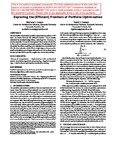Exploring the (Efficient) Frontiers of Portfolio Optimization
| dc.contributor.author | Craven, MJ | |
| dc.contributor.author | Graham, DI | |
| dc.contributor.editor | Bosman PAN | |
| dc.date.accessioned | 2017-07-20T17:23:01Z | |
| dc.date.available | 2017-07-20T17:23:01Z | |
| dc.date.issued | 2017-07-18 | |
| dc.identifier.isbn | 978-1-4503-4939-0 | |
| dc.identifier.uri | http://hdl.handle.net/10026.1/9634 | |
| dc.description.abstract |
The cardinality-constrained portfolio optimization problem is NP-hard. Its Pareto front (or the Efficient Frontier - EF) is usually calculated by stochastic algorithms, including EAs. However, in certain cases the EF may be decomposed into a union of sub-EFs. In this work we propose a systematic process of excluding sub-EFs dominated by others, enabling us to calculate non-dominated sub-EFs. We then calculate whole EFs to a high degree of accuracy for small cardinalities, providing an alternative to EAs in those cases. We can use also this to provide insight into EAs on the problem. | |
| dc.format.extent | 19-20 | |
| dc.language.iso | en | |
| dc.publisher | ACM | |
| dc.subject | Portfolio optimization | |
| dc.subject | Pareto front | |
| dc.subject | quadratic programming | |
| dc.subject | evolutionary algorithms | |
| dc.subject | multi-objective problem | |
| dc.title | Exploring the (Efficient) Frontiers of Portfolio Optimization | |
| dc.type | conference | |
| dc.type | Proceedings Paper | |
| plymouth.author-url | https://www.webofscience.com/api/gateway?GWVersion=2&SrcApp=PARTNER_APP&SrcAuth=LinksAMR&KeyUT=WOS:000625865500010&DestLinkType=FullRecord&DestApp=ALL_WOS&UsrCustomerID=11bb513d99f797142bcfeffcc58ea008 | |
| plymouth.date-start | 2017-07-15 | |
| plymouth.date-finish | 2017-07-19 | |
| plymouth.publisher-url | https://doi.org/10.1145/3067695 | |
| plymouth.conference-name | GECCO 2017 | |
| plymouth.publication-status | Published | |
| plymouth.journal | Proceedings of the Genetic and Evolutionary Computation Conference Companion | |
| dc.identifier.doi | 10.1145/3067695.3082036 | |
| plymouth.organisational-group | /Plymouth | |
| plymouth.organisational-group | /Plymouth/Faculty of Science and Engineering | |
| plymouth.organisational-group | /Plymouth/Faculty of Science and Engineering/School of Engineering, Computing and Mathematics | |
| plymouth.organisational-group | /Plymouth/REF 2021 Researchers by UoA | |
| plymouth.organisational-group | /Plymouth/REF 2021 Researchers by UoA/EXTENDED UoA 10 - Mathematical Sciences | |
| plymouth.organisational-group | /Plymouth/REF 2021 Researchers by UoA/EXTENDED UoA 10 - Mathematical Sciences/UoA 10 - Former and non-independent | |
| plymouth.organisational-group | /Plymouth/REF 2021 Researchers by UoA/UoA10 Mathematical Sciences | |
| plymouth.organisational-group | /Plymouth/Research Groups | |
| plymouth.organisational-group | /Plymouth/Research Groups/Marine Institute | |
| plymouth.organisational-group | /Plymouth/Users by role | |
| plymouth.organisational-group | /Plymouth/Users by role/Academics | |
| dc.publisher.place | Berlin, Germany | |
| dcterms.dateAccepted | 2017-04-27 | |
| dc.rights.embargoperiod | No embargo | |
| rioxxterms.versionofrecord | 10.1145/3067695.3082036 | |
| rioxxterms.licenseref.uri | http://www.rioxx.net/licenses/all-rights-reserved | |
| rioxxterms.licenseref.startdate | 2017-07-18 | |
| rioxxterms.type | Conference Paper/Proceeding/Abstract |


